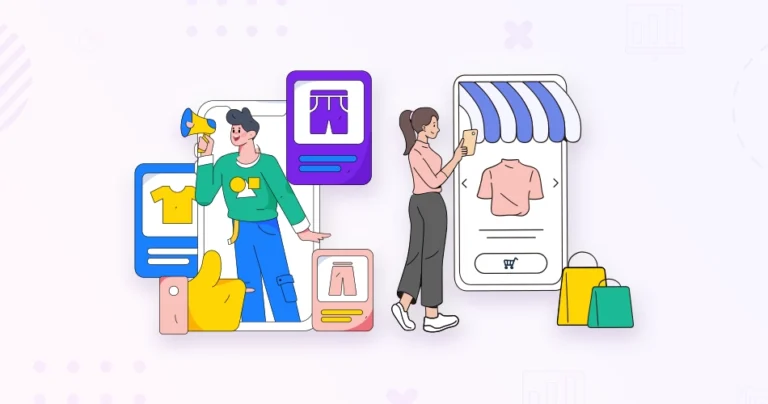In this age of social media, platforms like Instagram, X, Facebook, Snapchat, Youtube, etc. boast crazy numbers in traffic and engagement. Did you know Facebook has the highest MAU (monthly active users) of 3.05 Billion? And Instagram, Youtube, and X aren’t far back either.
Although these platforms are quite distinct in their own rights, there is a massive similarity among them. That is influencers. They are, sort of, authority figures, adored by millions. So when they rave about your product, it sparks curiosity, ignites trust, and bam! Orders flood in. That’s why the eCommerce experts consider it one of the best eCommerce marketing strategies.
So how to use influencer marketing in eCommerce? And what kind of benefits will it offer? We’ll explain everything about that. But first, let’s see who influencers are.
Who are Influencers?
Influencers are individuals who have successfully built a reputation and fan following on social media platforms through their knowledge and expertise or pure entertainment. Their follower count or subscribers are in thousands and even millions. So you can say their opinions and recommendations carry weight with their audience, often more than official authorities.
Take MrBeast, for example. He’s a popular Youtuber and social media influencer with over 234 million subscribers on Youtube and just under 50 million followers on Instagram. Often, when he promotes a product, the sales on it go through the roof in a matter of hours, and sometimes, even minutes. That alone should give you an idea of the social media impact on eCommerce.
Now, there are three types of influencers on social media.
- Mega-influencers: These are celebrities or well-known personalities with millions of followers. They can be very effective at raising brand awareness. But their endorsements can come across as impersonal or inauthentic, unless they are somehow relevant to the product. Example: MrBeast.
- Macro-influencers: These influencers have hundreds of thousands (or millions) of followers and are often experts in their niche. They can be a good choice for brands that want to reach a specific target audience. Example: Donut Media. If they promote a product related to automobiles, it will be relevant and authoritative.
- Micro-influencers: These influencers have smaller followings, typically between 10,000 and 50,000. However, they often have a more engaged audience and their recommendations can be seen as more trustworthy. They can be a great option for brands with limited budgets.
The type of influencer you choose will depend on your budget, target audience, and marketing goals. But no matter who you choose, it’s important to make sure that they are a good fit for your brand.
After you have chosen an influencer for marketing your eCommerce website or marketplace, there are a few practices recommended by the eCommerce development services.
How to Use Influencer Marketing in eCommerce?
Influencer marketing can be a powerful strategy for eCommerce businesses to increase brand awareness, drive traffic, and boost sales. But navigating this realm requires more than just throwing freebies at popular faces. Here’s a step-by-step guide on how to use influencer marketing in eCommerce:
- Define Your Goals: Clearly outline your objectives. Whether it’s increasing brand awareness, driving traffic, or boosting sales, understanding your goals will help shape your influencer marketing strategy.
- Identify Your Target Audience: Know your target audience and find influencers who have followers that align with your ideal customer demographic. This ensures that the influencer’s audience is more likely to be interested in your products.
- Research and Identify Influencers: Look for influencers who have a genuine connection with their audience and align with your brand values. Consider factors such as engagement rates, authenticity, and relevance to your niche. Tools like social media analytics platforms can assist in identifying suitable influencers.
- Build Relationships with Influencers: Establish a relationship with influencers before reaching out for collaboration. Engage with their content, share their posts, and show genuine interest in their work. This helps in creating a more authentic collaboration.
- Craft a Clear Collaboration Strategy: Clearly define the terms of the collaboration, including deliverables, timelines, and compensation. Be transparent about your expectations and make sure the influencer understands your brand message.
- Create Compelling Content: Work with influencers to create engaging and authentic content that resonates with their audience. Encourage creativity while ensuring that the content aligns with your brand image and message. That’s the key to content marketing in eCommerce.
- Leverage Multiple Platforms: Utilize various social media platforms where your target audience is active. Instagram, YouTube, TikTok, Facebook, and X are popular platforms for influencer marketing. Tailor your strategy to fit the unique characteristics of each platform.
- Track and Measure Performance: Implement tracking tools to measure the success of your influencer marketing campaign. Monitor key performance indicators (KPIs) such as engagement rates, reach, website traffic, and sales. This data will help you assess the effectiveness of your strategy.
- Encourage User-Generated Content (UGC): Encourage influencers to create content that encourages their followers to engage with your brand. UGC can be a valuable asset for your eCommerce business and can be repurposed in your marketing efforts.
- Comply with Regulations: Be aware of and comply with regulations related to influencer marketing, such as disclosing paid partnerships. Non-compliance can lead to legal issues and damage your brand’s reputation.
- Nurture Ongoing Relationships: Building long-term relationships with influencers can be beneficial for sustained success. Nurturing ongoing partnerships can lead to continued brand advocacy and a loyal influencer base.
- Adapt and Iterate: Continuously assess the performance of your influencer marketing campaigns and be willing to adapt your strategy based on the results. Learn from each collaboration to refine and optimize future campaigns.
Incorporating influencer marketing into your eCommerce strategy requires careful planning and execution. But when done effectively, it can significantly impact your brand’s visibility and success. So consult with the best ecommerce development company and implement influencer marketing effectively.
What are the Benefits of Using Influencer Marketing in eCommerce?
Influencer marketing is an outstanding strategy for getting new audiences to your eStore. Now, one of the obvious benefits is an endorsement from someone with a good online following. But there are some other benefits as well. Let’s take a look:
- Reach New Audiences: Influencers connect you with their established communities, expanding your reach beyond your own channels.
- Targeted Exposure: Choose influencers whose audience overlaps with your ideal customer, ensuring your message resonates with the right people.
- Credibility Boost: Consumers trust recommendations from trusted figures, boosting your brand’s legitimacy and trustworthiness.
- Interactive Content: Influencers create engaging content like tutorials, reviews, and Q&A sessions, fostering deeper connections with your audience.
- Humanized Brand Voice: Influencers add a personal touch, making your brand feel relatable and approachable, fostering loyalty and trust.
- Community Building: Influencers can spark conversations and interactions around your brand, building a vibrant community of fans and advocates.
- Direct Conversions: Influencer-driven promotions and discount codes can lead to immediate sales through their established audience.
- Brand Preference: Positive influencer experiences can sway purchase decisions, making your brand the preferred choice over competitors.
- Increased Website Traffic: Influencer content can drive traffic to your website, leading to higher conversion rates and sales in the long run.
- Audience Understanding: Influencer campaigns provide valuable data on your target audience’s preferences and behavior, informing future marketing strategies.
- Content Optimization: Analyze influencer content performance to understand what resonates with your audience and optimize your own content accordingly.
- Trend Identification: Influencers often stay ahead of the curve on industry trends, offering valuable insights for product development and marketing.
- Targeted Reach: Compared to traditional advertising, influencer marketing allows you to reach a specific audience with higher conversion potential, potentially at a lower cost.
- Organic Growth: Successful influencer partnerships can lead to organic brand mentions and audience engagement, amplifying your reach without additional spending.
- Long-Term Value: Building lasting relationships with influencers can lead to ongoing content creation and promotion, providing long-term benefits for your brand.
Influencer marketing is a strategic investment, not a magic bullet. All you can control is executing this strategy effectively. What kind of results it will offer will only be apparent after that. So for that you can hire dedicated Ecommerce developers from our team and implement influencer marketing to the tee.
Conclusion
Influencer marketing can be excellent for bringing users to an eCommerce website. By partnering with influential people, businesses can capitalize on their reach and credibility. Influencers create content that resonates with their audience, making them a valuable asset.
Instead of traditional advertising, eCommerce brands can use the trust and influence of influencers. This allows them to promote products in a genuine way. By aligning with an influencer whose values match the target market, eCommerce brands can foster a strong connection with potential customers.
So, want to use influencer marketing in eCommerce? Then talk to our experts today!
FAQs on Using Influencer Marketing in eCommerce
Q1. How can I find suitable influencers for my eCommerce business?
To find the suitable influencers for your eCommerce business:
- Research platforms like Instagram, YouTube, and TikTok relevant to your niche.
- Search for influencers creating content related to your products or industry.
- Look for influencers with high engagement rates and active, genuine communities.
- Have they worked with similar brands? How successful were the campaigns?
- Use engagement metrics tools to assess audience authenticity and interaction.
Q2. How can I measure the success of influencer marketing campaigns in eCommerce?
To measure the success of influencer marketing campaigns in eCommerce, you can track metrics such as engagement rate, reach, website traffic, conversions, and sales. Utilize tracking links, unique discount codes, or affiliate programs to attribute sales directly to the influencer’s promotion.
Q3. What budget should I allocate for influencer marketing in my eCommerce strategy?
The budget for influencer marketing in your eCommerce strategy can vary depending on factors like the size of your business, campaign goals, and the chosen influencers’ rates. Consider both the monetary compensation for the influencers and any products or services you may provide to them.
Share this story, choose your platform!
Priyanka is a highly vetted expert who seamlessly blends the worlds of Marketing and UI/UX. Specializing across diverse industry domains, her unique strength lies in her deep understanding of human psychology. This insightful grasp allows her to craft marketing strategies and design user experiences that are not only aesthetically pleasing and functional but are also precisely tailored to influence user behavior and drive meaningful engagement.





